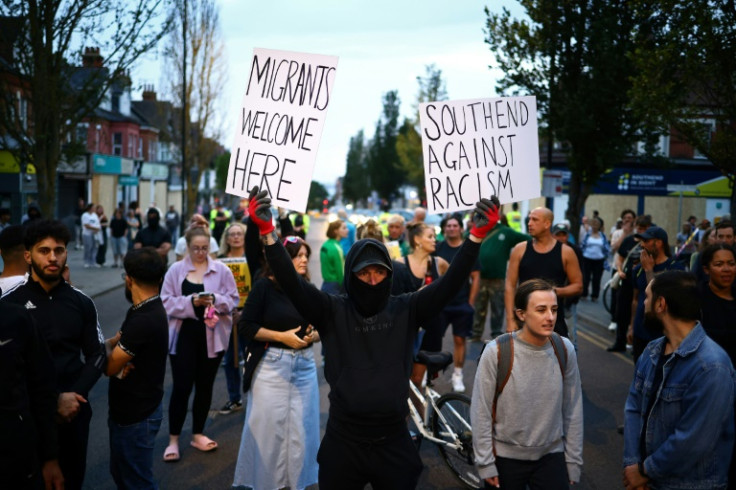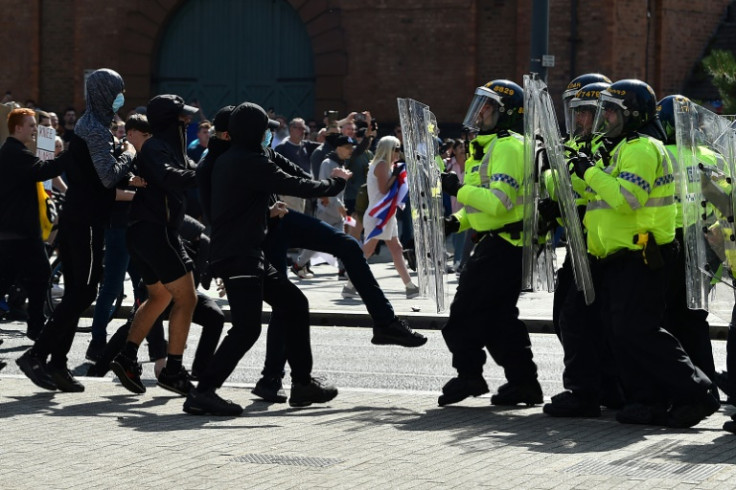Relief After UK Streets See Respite From Far-right Riots

The UK government and police breathed a sigh of relief on Thursday after further anticipated far-right riots failed to materialise overnight and thousands of anti-racism protesters massed on the streets instead.
The anti-racism demonstrations on Wednesday evening passed off almost entirely peacefully, after police flooded the streets of numerous English towns and cities and reiterated violence by suspected far-right agitators would not be tolerated.
It follows a week of near nightly riots -- during which mosques and migrant-related facilities have been attacked -- nationwide and in Northern Ireland.
The violence was fuelled by misinformation spread on social media about the suspected perpetrator of a knife attack on July 29 which killed three children.
London's Metropolitan Police chief Mark Rowley, who ordered thousands of officers onto the streets of the capital on Wednesday, said he was "really pleased" with how events unfolded.
"I think the show of force from the police -- and frankly, the show of unity from communities together -- defeated the challenges that we've seen," he told UK broadcasters.
Rowley noted there had been a small number of arrests due to "some local criminals" engaging in anti-social behaviour in some locations but that fears of "extreme-right disorder were abated".
Attention will now turn to the coming weekend and whether there will be a repeat of disorder then.
Some of the worst scenes of violence were recorded last weekend.
Junior interior minister Diana Johnson cautioned that Wednesday's respite was "just the start".
"It's good that we didn't see the level of disorder and criminality on our streets that we have in previous days," she told Sky News.
"There is now further intelligence of events during the next few days and we need to see what happens there."

Wednesday evening saw anti-racism and anti-fascist counter-protesters mass in considerable numbers, holding rallies in cities including London, Birmingham, Bristol, Liverpool and Newcastle.
"Whose streets? Our streets!" thousands chanted in Walthamstow, northeast London, where hundreds of pro-Palestine supporters joined the rally under a heavy police presence.
The government had put 6,000 specialist police on standby to deal with scores of potential flashpoints after far-right social media channels called for protests at an array of sites linked to immigration support services.
On Thursday, London mayor Sadiq Khan thanked "heroic police force working round the clock" and "those who came out peacefully to show London stands united against racism and Islamophobia".
"And to those far-right thugs still intent on sowing hatred and division: you will never be welcome here," he added on X.
Courts started on Wednesday to order jail terms for offenders tied to the unrest as authorities sought to deter fresh disorder.
The unrest, Britain's worst since the 2011 London riots, has seen hundreds arrested and at least 120 charged, and has led several countries to issue travel warnings for the UK.
London police said on Thursday that officers had made 10 further arrests overnight, a week after protests outside Downing Street in Westminster turned violent.
Rowley, who joined the dawn raids, said those arrested "aren't protestors, patriots or decent citizens".
"They're thugs and criminals," he noted, adding most had previous convictions for weapon possession, violence, drugs and other serious offences.
The riots broke out after three girls -- aged nine, seven and six -- were killed and five more children critically injured during a knife attack at a Taylor Swift-themed dance class in Southport, northwest England.
False rumours initially spread on social media saying the attacker was a Muslim asylum seeker.
The suspect was later identified as 17-year-old Axel Rudakubana, born in Wales.
UK media report that his parents are from Rwanda, which is overwhelmingly Christian.
© Copyright AFP 2025. All rights reserved.





















